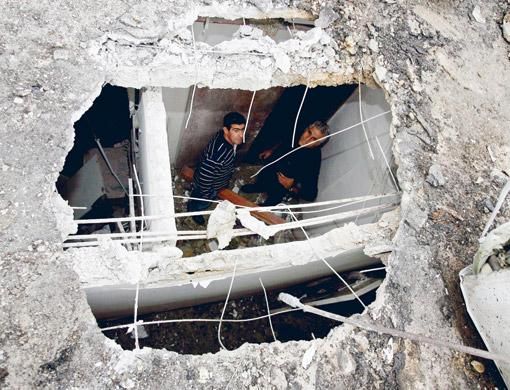Sderot, Israel: Everyone filed off the tour bus outside the police station in Sderot, less than a mile from the Gaza Strip border.
More than 30 journalists gathered as police spokesman Micky Rosenfeld began his practiced presentation, complete with charts, graphs and weapon fragments, emphasising the increasing range of rockets launched from Gaza and the one million Israelis now living within the threat zone.
Suddenly, an alarm indicated an incoming rocket: an awkward squawk followed by a recorded female voice saying "code red" in Hebrew.
Everyone hustled inside the police station; seconds later a thud shook the building. Rosenfeld listened on his radio and reported that two rockets had landed harmlessly, one about 300 metres away.
Unified message
Within 10 minutes, a member of the police bomb squad clunked two mangled rocket stumps onto the sidewalk. The journalists took pictures and touched the metal, which was still as hot as the muffler of a running car.
Drawing on mistakes made during its 2006 conflict with the Lebanese resistance movement Hezbollah, Israel has revamped its information operations, presenting a unified message, bottling leaks from the field and working to drive a wedge in Arab public opinion. Israel and its proponents have used set talking points: emphasising the eight years that southern residents have endured Gazan rocket fire; highlighting Israel's 2005 withdrawal of its soldiers and colonists from Gaza; and declaring the Gazan people to be hostages of a Hamas regime that sacrifices their lives.
There's also almost always some variation on the theme of, "What would America do if Mexico was launching rockets at Texas every day?" An Israeli reporter said he recently heard the Mexico analogy three times in the same day from a military officer, a government official and a civilian analyst. "As a reporter, that's a bit unnerving because you realise you're dealing with someone who has been fed responses," said the reporter. "It's very clear Israel has heavily invested in its (public relations) machine since the Lebanon war."
In comparison, Hamas media efforts are primitive. With its leaders in hiding and without the technical sophistication of the Israeli operation, the group is often limited to videotaped statements and news releases to local Gazan reporters. The Israeli media offensive, meanwhile, has extended onto the internet and television screens of viewers in the Arab world.
Government spokesman Mark Regev and Army spokeswoman Major Avital Leibovich have been daily fixtures on Al Jazeera from the start of the Israeli air assault December 27. The final television interview given by Prime Minister Ehud Olmert before the attack began was with Al Arabiya satellite news channel, in which he appealed directly to Gazans to overthrow Hamas themselves.
"We want to influence Palestinian thinking," Regev said.












